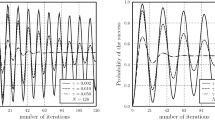Abstract
Amplitude amplification (AA) is tool of choice for quantum algorithm designers to increase the success probability of query algorithms that reads its input in the form of oracle gates. Geometrically speaking, the technique can be understood as rotation in a specific two-dimensional space. We study and use a generalized form of this rotation operator to design algorithms in a geometric manner. Specifically, we apply AA to algorithms that take their input in the form of input states and in which rotations with different angles and directions are used in a unified manner. We show that AA can be used to sequentially discriminate between two unitary operators, both without error and with bounded-error, in an asymptotically optimal manner. We also show how to reduce error probability in one and two-sided bounded error algorithms more efficiently than the usual parallel repetitions technique; in particular, errors can be completely eliminated from the exact error algorithms.
Access this chapter
Tax calculation will be finalised at checkout
Purchases are for personal use only
Similar content being viewed by others
Notes
- 1.
A similar question on exact two-sided-error classical class was asked in http://cstheory.stackexchange.com/questions/20027.
References
Grover, L.K.: A fast quantum mechanical algorithm for database search. In: Proceedings of 28th STOC (1996)
Magniez, F., Santha, M., Szegedy, M.: Quantum algorithms for the triangle problem. SIAM J. Comput. 37(2), 413–424 (2007)
Ozols, M., Roetteler, M., Roland, J.: Quantum rejection sampling. ACM Trans. Comput. Theory 5(3), 1–33 (2013)
Kobayashi, H., Matsumoto, K., Tani, S.: Simpler exact leader election via quantum reduction. Chic. J. Theor. Comput. Sci. 2014(10) (2014)
Berry, D.W., Childs, A.M., Cleve, R., Kothari, R., Somma, R.D.: Exponential improvement in precision for simulating sparse Hamiltonians. In: Proceedings of the 46th STOC (2014)
Brassard, G., Høyer, P., Mosca, M., Tapp, A.: Quantum amplitude amplication and estimation. Contemp. Math. 305, 53–74 (2002)
Yoder, T.J., Low, G.H., Chuang, I.L.: Fixed-point quantum search with an optimal number of queries. Phys. Rev. Lett. 113, 210501 (2014). https://journals.aps.org/prl/abstract/10.1103/PhysRevLett.113.210501
Lipton, R.J., Regan, K.W.: Quantum Algorithms via Linear Algebra: A Primer. The MIT Press, Cambridge (2014)
Kawachi, A., Kawano, K., Le Gall, F., Tamaki, S.: Quantum query complexity of unitary operator discrimination. In: Cao, Y., Chen, J. (eds.) COCOON 2017. LNCS, vol. 10392, pp. 309–320. Springer, Cham (2017). https://doi.org/10.1007/978-3-319-62389-4_26
Bera, D.: Detection and diagnosis of single faults in quantum circuits. IEEE Trans. Comput.-Aided Des. Integr. Circuits Syst. 37(3), 587–600 (2018)
Acin, A.: Statistical distinguishability between unitary operations. Phys. Rev. Lett. 87(17), 177901 (2001)
Bennett, C.H., Bernstein, E., Brassard, G., Vazirani, U.: Strengths and weaknesses of quantum computing. SIAM J. Comput. 26(5), 1510–1523 (1997)
Biham, E., Biham, O., Biron, D., Grassl, M., Lidar, D.A.: Grover’s quantum search algorithm for an arbitrary initial amplitude distribution. Phys. Rev. A 60(4), 2742 (1999)
Biham, E., Kenigsberg, D.: Grover’s quantum search algorithm for an arbitrary initial mixed state. Phys. Rev. A 66(6), 062301 (2002)
Høyer, P.: Arbitrary phases in quantum amplitude amplification. Phys. Rev. A 62(5), 052304 (2000)
D’Ariano, G.M., Presti, P.L., Paris, M.G.: Using entanglement improves the precision of quantum measurements. Phys. Rev. Lett. 87(27), 270404 (2001)
Duan, R., Feng, Y., Ying, M.: Entanglement is not necessary for perfect discrimination between unitary operations. Phys. Rev. Lett. 98(10), 100503 (2007)
Bera, D.: Amplitude amplification for operator identification and randomized classes. Technical report TR14-151. Electronic Colloquium on Computational Complexity (2018)
Bera, D., Green, F., Homer, S.: Small depth quantum circuits. ACM SIGACT News 38(2), 35–50 (2007)
Høyer, P., de Wolf, R.: Improved quantum communication complexity bounds for disjointness and equality. In: Alt, H., Ferreira, A. (eds.) STACS 2002. LNCS, vol. 2285, pp. 299–310. Springer, Heidelberg (2002). https://doi.org/10.1007/3-540-45841-7_24
Buhrman, H., de Wolf, R.: Communication complexity lower bounds by polynomials. In: Proceedings of the 16th CCC (2001)
Author information
Authors and Affiliations
Corresponding author
Editor information
Editors and Affiliations
Rights and permissions
Copyright information
© 2018 Springer International Publishing AG, part of Springer Nature
About this paper
Cite this paper
Bera, D. (2018). Amplitude Amplification for Operator Identification and Randomized Classes. In: Wang, L., Zhu, D. (eds) Computing and Combinatorics. COCOON 2018. Lecture Notes in Computer Science(), vol 10976. Springer, Cham. https://doi.org/10.1007/978-3-319-94776-1_48
Download citation
DOI: https://doi.org/10.1007/978-3-319-94776-1_48
Published:
Publisher Name: Springer, Cham
Print ISBN: 978-3-319-94775-4
Online ISBN: 978-3-319-94776-1
eBook Packages: Computer ScienceComputer Science (R0)




